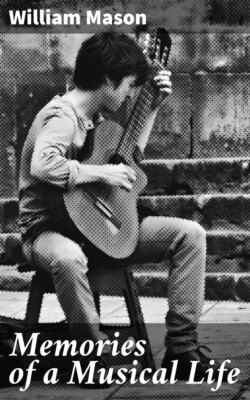Читать книгу Memories of a Musical Life - William Mason - Страница 26
На сайте Литреса книга снята с продажи.
A VISIT TO WAGNER.
ОглавлениеTable of Contents
MY parents joined me in Leipsic in January, 1852, and in the spring of that year we planned a tour which was to take us to Switzerland in June.
In Leipsic I made the acquaintance of a man named Albert Wagner, meeting him quite frequently at the restaurant where I took my meals. While I was planning the tour, I chanced to mention it to him, and when he heard that I was going to Zürich, he said: "My brother, Richard Wagner, lives there. I will give you a letter of introduction to him." This was the first intimation I had that Albert was a brother of the composer. I suppose he had not thought it worth while to tell me. Richard was still under a political cloud in Saxony, and was compelled to live in exile on account of the part he had taken in the revolution of 1848; nor was his reputation as a composer then so general that Albert would have thought his kinship much to boast of.
Autograph of Moritz Hauptmann
We reached Zürich on June 5, 1852, and, the next morning, armed with the letter, I made my way to Wagner's chalet, which was situated on a hill in the suburbs. It was then about ten o'clock in the morning.
When I asked the maid who opened the door if Herr Wagner was at home and to be seen, she answered, as I had feared she would, that he was busily at work in his study, and could not be disturbed. I handed her my letter of introduction, and asked her to give it to Herr Wagner, and to say to him that I was expecting to remain in Zürich three or four days, and would call again, hoping to be fortunate enough to find him disengaged.
Just as I was turning to leave, I heard a voice at the head of the stairs call out, "Wer ist da?" I told the maid to deliver my letter immediately. As soon as Wagner had glanced through it, he exclaimed, "Kommen Sie herauf! Kommen Sie herauf!"
At that time Wagner was known, and that not widely, only as the composer of "Rienzi," "The Flying Dutchman," "Tannhäuser," and "Lohengrin." I had heard only "The Flying Dutchman," but considered it a most beautiful work, and was eager to meet the composer.
Wagner's first words, as I met him on the landing at the head of the stairs, were: "You've come just at the right time. I've been working away at something, and I'm stuck. I'm in a state of nervous irritation, and it is absolutely impossible for me to go on. So I'm glad you've come."
I remember perfectly my first impression of him. He looked to me much more like an American than a German. After asking about his brother, he began questioning me in a lively way about his friends in Leipsic, about the concerts and opera there, and the works that had been given. He also asked most kindly after my own affairs—what I was doing, with whom I had studied, how long I intended to remain, what my plans were for the future, and most particularly about musical matters in America. In some way Beethoven was mentioned. After that the conversation became a monologue with me as a listener, for Wagner began to talk so fluently and enthusiastically about Beethoven that I was quite content to keep silent and to avoid interrupting his eloquent oration.
